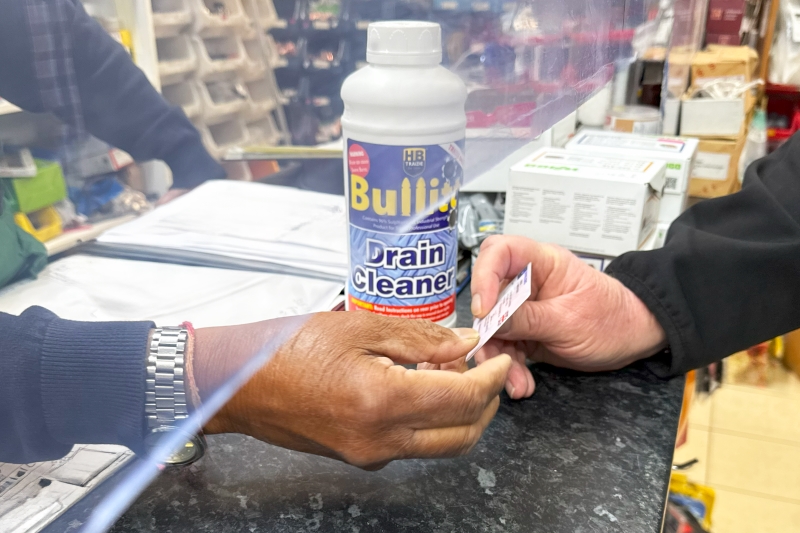
Scarlet Banks, Director at Hilton Banks, explains what you need to know to stay compliant when using acid-based cleaners
If you’ve ever had to clear a serious drain blockage or deal with stubborn limescale, you’ll know that some jobs need more than just a standard cleaner. In high-use environments, grease, scale and food debris can build up fast, leading to slow drainage, bad smells and even costly downtime. High-strength acid-based cleaners are essential for breaking down tough blockages and keeping everything running smoothly.
However, these powerful products come with strict rules. Since October 2023, the Control of Explosives Precursors and Poisons Regulations 2023 has put tighter controls on who can buy high-strength acids and how they should be stored and handled. If you’re a trade professional who relies on these cleaners, it’s important to understand the new regulations to avoid delays or being refused a sale when making a purchase.
What are acid-based cleaners?
Acid-based cleaners are designed to dissolve tough deposits like grease, hair, paper, food debris, limescale and mineral build-up from drains, toilets and industrial surfaces. Unlike household cleaners, these products are used in settings where heavy use has led to blockages or scale build-up that need a fast and powerful solution.
There are two main types of acid-based cleaners. Hydrochloric acid-based solutions, such as HB Trade’s Spirits of Salt, are commonly used for descaling in washrooms, commercial kitchens and industrial equipment affected by hard water deposits. Sulphuric acid-based cleaners, such as HB Trade’s Bullitt Drain Cleaner, are used for quickly clearing blocked drains, as they rapidly break down grease, hair and other organic matter.

Understanding the regulations
The Control of Explosives Precursors and Poisons Regulations 2023 was introduced to prevent the misuse of high-strength acids and, put simply, any chemical that can be used in the illicit manufacture of explosives or as a poison is now tightly controlled. Both hydrochloric acid (10% concentration or higher) and Sulphuric acid (15% concentration or higher) fall into this category. These products are now classified as regulated substances, meaning that not everyone can buy them.
To purchase these chemicals as an individual, an Explosives Precursors and Poisons (EPP) licence is required which proves you are authorised to buy and use such substances. If you’re a trade professional you don’t need a licence, but you do need to prove you’re in the trade when purchasing regulated products. This means providing photo ID (a passport, driving licence, trade or business ID) and your business details.
If you’re purchasing on behalf of a company, you must give the name of an authorised buyer and VAT number if the business is VAT registered. If you are a regular customer, you will only need to provide these details every 18 months, unless any significant changes are made to an order.
Anyone who can’t provide the right information will not be able to buy these products and if a seller thinks anything seems suspicious about the sale, like a request for an unusually large quantity, they are legally required to report it. These rules are in place to ensure that only professionals with a genuine need can access these chemicals so turn up at a supplier without the correct ID or business details and you won’t be able to complete your purchase – which could delay urgent jobs.
However, if the extra paperwork is an issue, there are lower-strength alternatives available that don’t require additional checks. HB Trade, for example, offers a lower-strength version of Bullitt: Bullitt Kitchen and Bathroom (caustic soda based) and Bullitt Biological (enzyme based) that still provides effective drain cleaning without the extra restrictions.

Using acid-based cleaners safely
Everyone, even experienced professionals, need to take care when using high-strength acids. These products can cause serious burns if they come into contact with skin and release toxic fumes if mixed with other substances.
To use them safely, always read the label and follow the instructions carefully. Wear protective gear, including gloves, eye protection and suitable clothing. Make sure the area is well-ventilated to prevent inhaling fumes and never mix acids with bleach or alkaline cleaners as this can create dangerous gases.
Storage is just as important – these products must be kept securely to prevent unauthorised access and when it’s time to dispose of any waste, local regulations must be followed to guarantee it’s done safely and legally.
For plumbers, drainage professionals and maintenance teams, high-strength acid-based cleaners are a great tool for tackling tough blockages and deep cleaning – with the new rules in place, buying them just requires more care and preparation. Making sure you have the right ID and business details before heading to the counter will save time and hassle and ensure you can continue using these powerful solutions effectively and legally.
To find out more about Hilton Banks visit www.hiltonbanks.com/bullitt/.







